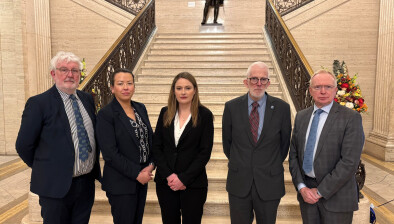NI Court of Appeal: Limavady bomb convictions found unsafe on grounds of abuse of process

Northern Ireland’s Court of Appeal has determined that the convictions of three men relating to the planting of a bomb at Limavady Football Club in 1989 were unsafe on grounds of abuse of process, due to a failure on part of the police to disclose material which revealed serious police misconduct.

About this case:
- Citation:[2025] NICA 41
- Judgment:
- Court:NI Court of Appeal
- Judge:Lady Chief Justice Siobhan Keegan
Delivering judgment for the Court of Appeal, Lady Chief Justice Siobhan Keegan conveyed the majority’s decision that the deliberate police misconduct in the case was of such a level as to offend the Court of Appeal’s sense of justice and propriety, and undermined public confidence in the justice system.
Mr McDowell KC with Mr Steer KC appeared for the Crown instructed by the Public Prosecution Service, Mr Skelt KC with Ms Cheshire appeared as Special Advocates representing the interests of the appellants, Mr Macdonald KC with Ms Smyth appeared for Mr Murphy instructed by Phoenix Law Solicitors, Mr D Hutton KC with Mr T Madden appeared for Mr Moen instructed by Phoenix Law Solicitors, and Mr Larkin KC with Mr O’Keeffe KC appeared for Mr Gilmore instructed by Phoenix Law.
Background
In 1991, the appellants were convicted for possession of explosive substances with intent. The convictions related to a bomb which was planted at Limavady Football Club’s grounds ahead of a match against the Royal Ulster Constabulary (RUC) in 1989.
The Criminal Cases Review Commission (CCRC) referred the appellants’ cases to the Court of Appeal pursuant to s.10 of the Criminal Appeal Act 1995. The CCRC’s referral was accompanied by closed documents which included a confidential annex, which were read by each member of the Court of Appeal.
The court also received submissions from counsel for the Public Prosecution Service (PPS) and counsel acting as Special Advocates.
The Court of Appeal
Lady Chief Justice Keegan outlined that the first issue arising from the papers filed and the submissions of counsel was whether the disclosure test had been met in relation to the material included in the confidential annex.
Explaining that all members of the Court of Appeal agreed that the test had not been met in respect of one of the aspects of the CCRC reference, the Lady Chief Justice noted that the court unanimously agreed that the disclosure test was met in other aspects as it may have supported an application on another aspect of the CCRC reference and in this regard, it was determined that public interest immunity applied.
The court recounted that upon being informed of that decision, the Special Advocates and the PPS successfully argued that the interests of the appellants could be protected by the Special Advocates arguing on their behalf on the basis that the material had met the test for disclosure.
Accordingly, the court heard submissions on the consequences of the material now considered to be disclosable and on an “abuse of process” ground of appeal which was advanced by the Special Advocates.
The court considered the test for placing a stay on proceedings on grounds of abuse of process as set out in R v Maxwell [2011] 1 WLR 1837 and Warren v Attorney General for Jersey [2012] 1 AC 22, being the court can stay proceedings, firstly, where it will be impossible to give the accused a fair trial, and secondly, where if offends the court’s sense of justice and propriety to be asked to try the accused in the particular circumstances of the case.
Noting that counsel agreed that the matter before the Court of Appeal was in the latter category of cases requiring a balancing exercise, the court heard from the Special Advocates that the failure of the police to disclose material in the original trial which would have revealed serious police misconduct merited allowing the appeals.
The Lady Chief Justice outlined that the PPS had conceded that the misconduct was indefensible, but argued that it had no impact on the fairness of the trial and that the convictions were safe, where the misconduct fell short of the type of misconduct that would constitute abuse of process as described in Horseferry Road Magistrates ex parte Bennett.
In the circumstances, Lord Justice Seamus Treacy and Mr Justice Adrian Colton, representing the majority of the Court of Appeal, decided that the abuse of process issues arising were of such of a level of deliberate police misconduct to offend the court’s sense of justice and propriety and to undermine public confidence in the justice system, and allowed the appeal.
The Lady Chief Justice found that the whilst the conduct of the police was reprehensible, that conduct was outweighed by the competing public interest in the prosecution of serious terrorist offences.
Conclusion
Accordingly, the Court of Appeal determined that the appellants’ convictions were unsafe on grounds of abuse of process.
The King v Declan Murphy, Declan Moen and Conor Gilmore [2025] NICA 41










